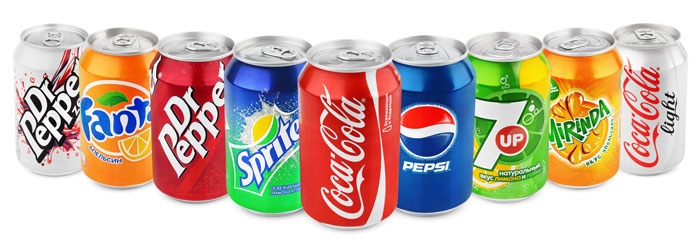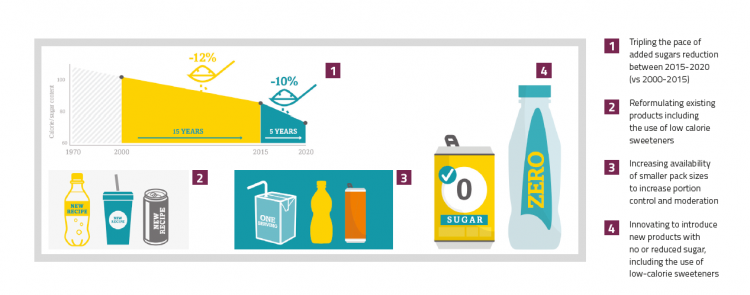The soft drinks industry to reduce added sugars a further 10% by 2020
- Like
- Digg
- Del
- Tumblr
- VKontakte
- Buffer
- Love This
- Odnoklassniki
- Meneame
- Blogger
- Amazon
- Yahoo Mail
- Gmail
- AOL
- Newsvine
- HackerNews
- Evernote
- MySpace
- Mail.ru
- Viadeo
- Line
- Comments
- Yummly
- SMS
- Viber
- Telegram
- Subscribe
- Skype
- Facebook Messenger
- Kakao
- LiveJournal
- Yammer
- Edgar
- Fintel
- Mix
- Instapaper
- Copy Link
Posted: 22 June 2017 | Sigrid Ligné | Director General | UNESDA Soft Drinks Europe | 1 comment
The European soft drinks industry has recently announced that it will be accelerating the speed and scale of its added-sugars reduction efforts to deliver a further 10% reduction from 2015-2020. Sigrid Ligné, Director General, UNESDA Soft Drinks Europe, discusses the number of reasons the soft drinks industry has been prompted to triple reduction efforts.
OUR sector has been on this added sugars reduction journey since the 1970s when the first no and low-calorie drinks were introduced, and we have already reduced calories by 12% since 2000. Reducing added sugars in our products addresses changing consumer preferences. Our customers are more conscious than ever about their sugar and calorie intake. We support the views of the world’s leading health authorities that people should control their added sugars intake – and that includes sugar from soft drinks. In soft drinks reducing added sugars leads directly to reduced calories and our sector is committed to playing its part in reducing overall calorie consumption in order to address overweight and obesity.
Reducing added sugars an aggregate 10% across Europe will impact over 500 million consumers. Added sugars reduction also responds to the EU call for reformulation and sugar reduction across the food industry. We endorse the EU Roadmap for Action on Food Product Improvement and are proud to be the first sector to respond to the EU Added Sugar Annex and its 10% sugar reduction target. We fully support Commissioner Andriukaitis’ ambition that all sectors must play their part and are honoured that he has responded positively to our initiative. We hope that others will follow suit in order to generate critical mass.
The EU’s partnership-based policy approach to reformulation and sugar reduction involves all stakeholders in driving a successful strategy and is most welcome. It allows sufficient flexibility to reflect local situations and optimise a variety of tools in achieving the reduction goal. This enables our industry to deliver speed and scale in reducing the sugar mix across the entire soft drinks portfolio. Our UNESDA membership represents 80% of the soft drinks industry in Europe by value and our commitment is made across all soft drinks categories including still drinks, fruit drinks, carbonates, energy drinks, sports drinks, dilutables and iced teas and coffees. It does not include bottled water, juices, milk-based and hot beverages, which do not fall within the UNESDA remit. The soft drinks industry is already working with governments and stakeholders in many countries across Europe, signing local sugar or calorie reduction pledges. We will achieve this new EU target through a combination of four key actions. Firstly, reformulating existing products to reduce their sugar content – including using no and low-calorie sweeteners. This is an ongoing process and many of the core brands that are on sale today contain 40% less sugar than they did a few years ago.
The second approach is through innovation to introduce new products with no or reduced sugar. We have always been an innovative sector and strive to harness the very latest technologies and advances in order to off er consumers a variety of great-tasting drinks. Of course as the calories in soft drinks come from sugar, if we replace the sugar with a no-calorie sweetener then we can provide consumers with a product that has no calories at all. No and reduced sugar products are the primary focus of our industry’s innovation eff orts and 66% of all new product innovations fall into this category. Our third tool to reduce added sugars is increasing the availability and range of smaller pack sizes. This allows portion control and encourages moderation in consumption. The availability of pack sizes smaller than 330ml has increased 150% since 2006 and there are now over 30 diff erent small packs to choose from, including cans, bottles, PET and pouches. Reducing pack sizes proves to be effective. The McKinsey Global Institute report – ‘Overcoming obesity: an initial economic analysis’ – found controlling portion size to be one of the most cost-effective ways to reduce calories in the diet.
The fourth element in our armoury is promotion. Our industry will increase investment behind the promotion of no and reduced sugar drinks in order to educate consumers and actively encourage choice towards those products with less sugar. Already advertising spend behind no and low drinks has doubled in many markets in recent years and this has borne fruit: no and low calorie drinks now represent over 40% of soft drinks sales in a number of European markets. However, the picture across Europe is very mixed, refl ecting the very diff erent dietary habits and customs across the continent. By continuing to shift advertising and promotional spends to no and reduced sugar drinks, UNESDA members are committed to encouraging greater consumer take up and thereby reducing sugar consumption.
Ensuring transparency
While the sector is focused on delivering the 10% added sugars reduction commitment, we also recognise that it is important to share the results of our eff orts. We will ensure that we are accountable and will monitor our progress using independent, external researchers and will be sure to share the data with all stakeholders in full transparency. This is not the fi rst time we have made commitments to deliver change. Way back in 2006 UNESDA members made a series of far-reaching commitments to the then newly formed EU Platform for Action on Diet, Physical Activity and Health. We promised to not advertise our products to children under the age of 12 right across the EU28 – and we don’t. Not on TV, in print, on the internet or on social media. Third party audits show that we are 99% compliant with this commitment. At the same time UNESDA members also committed to behave responsibly in schools. We agreed not to off er our products for sale in primary schools right across the EU28 – and we don’t. In secondary schools, where soft drinks are available, we pledged to off er them only in non-branded vending machines and to always ensure that a full range of drink varieties are on off er – including water, juices and no/low sugar options. We have used PriceWaterhouseCoopers to audit our schools commitments on a number of occasions and compliance levels are high. UNESDA members were over 95% compliant with their commitments in primary schools and 88% compliant in secondary schools. Meanwhile, the availability of sugar sweetened beverages in secondary schools has decreased by an average of 28. 5% in recent years – and in some countries it is a great deal more. We are not complacent, and continue to work with our distributors and partners to explain our commitments and encourage their support in upholding them.
About the author
SIGRID LIGNÉ is Director General at the Union of European Beverages Associations. Unesda, which was founded in 1958, the same year as the European Economic Community, has 11 corporate members and 22 National Association members and represents the non-alcoholic beverages sector including squashes, fruit drinks, carbonates, nectars, energy drinks and sports drinks. For more information please visit unesda.org.












“Reducing added sugars in our products addresses changing consumer preferences…”
It really doesn’t. See the furore over Lucasade’s sugar reduction (both the taste and the diabetics affected) for example
What it does do, however, is fold to the harridan cries of Big Public Health™ who bully consumers into less choice….
“We support the views of the world’s leading health authorities that people should control their added sugars intake ”
But it’s not ‘the people’ controlling it. It’s the producers fawningly bending to the will of tax-payer funded ‘charities’ and non-elected bodies (like the WHO) that wail that there’s too much sugar around, when there actually isn’t.